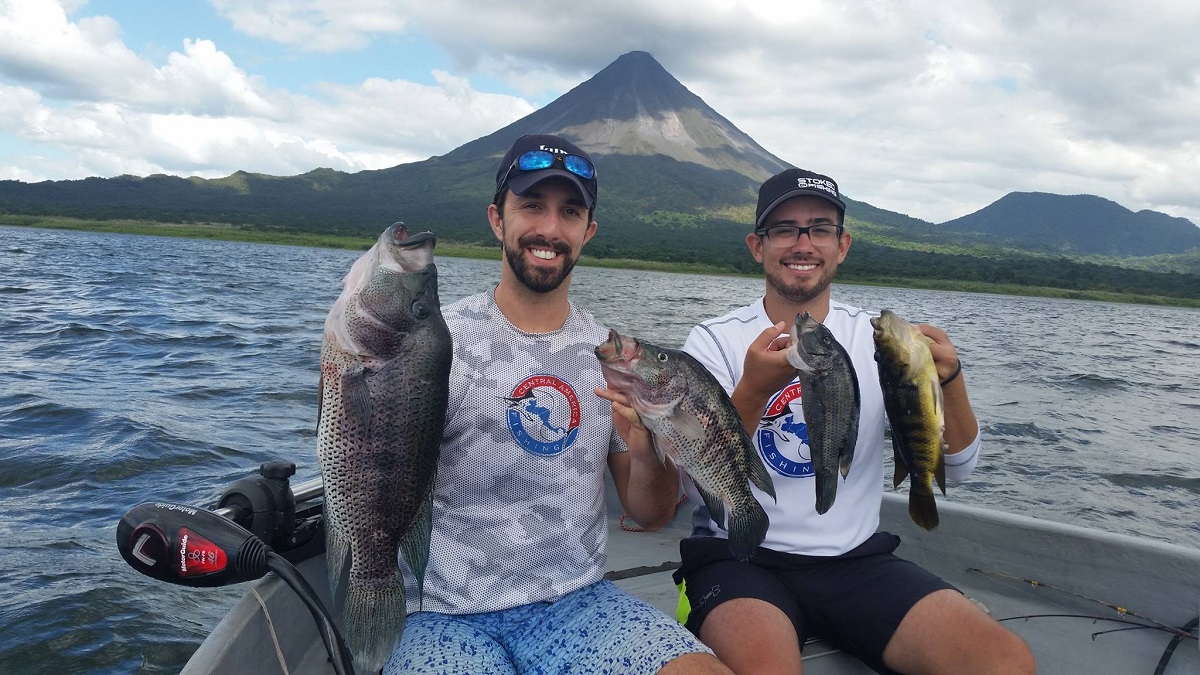Fishing in Costa Rica
Spoiled by Mother Nature as if it was her favorite child, Costa Rica has become one of the world’s most popular tourist destinations over the past two decades. It’s easy to see why with rain forests, cloud forests, amazing biodiversity, volcanoes, hot springs, and over 800 miles of gorgeous coastline on two different oceans. Costa Rica famously got its name from Christopher Columbus, who upon laying eyes on it proclaimed it to be a “rich coast”. Five hundred years later, turns out he was spot on with that assessment as now Costa Rica is one of the world’s foremost sport fishing destinations.
Fishing the Pacific Coast
The incredible numbers of marlin and sailfish caught here year after year is what first put fishing in Costa Rica on the map. Somewhere along the way, Costa Rica was named ‘the billfish capital of the world’, and with all due respect to other top spots like Mexico or Guatemala, it’s hard to say there is any other country more deserving of the title. During Costa Rica’s peak billfish season, which is from December through April, days spent offshore serve up opportunities for blue, black, and striped marlin and hordes of Pacific sailfish. While any day with a marlin sighting should be considered a success, it’s common to have 10-20 sailfish bites in a single day. It’s for this reason that several international billfish tournaments are held in Costa Rica, including the biggest offshore tournament of the year for the 5th year in a row – the Offshore World Championship.
 Costa Rica’s Pacific Coast offers some of the world’s best billfishing.
Costa Rica’s Pacific Coast offers some of the world’s best billfishing.
Costa Rica’s reputation as a billfish mecca comes not just from the eye-popping numbers of billfish released during the peak season, but from the fact that we truly catch them twelve months a year here. During the months of May to November, the billfish don’t disappear, they simply spread out and move to the northern region of the country. Adding to its spoils, over the past few years Costa Rica has developed the best marlin fishing in the world with overnight trips to the seamounts or FADs. Located anywhere from 80-150 miles offshore, our long-range boats can enjoy double-digit marlin bites out here. There simply aren’t many places on Earth that can produce billfish numbers as consistently as Costa Rica does all year round. Certainly, part of the reason the numbers are so spectacular year after year are the laws mandating the use of circle hooks instead of J-hooks and the strict catch-and-release policy of ALL billfish.
 The sun is scorching in Costa Rica, don’t forget to protect yourselves!
The sun is scorching in Costa Rica, don’t forget to protect yourselves!
There is certainly a lot more than just billfish swimming offshore, so if you want to catch your own dinner you’ll have a good chance to do that with yellow-fin tuna, dorado (mahi-mahi), and wahoo. The best months for these meat fish tend to be May-September during our green season, but they can be caught throughout the entire year. That said, in 2017 Costa Rica limited the amount of purse seiner licenses to foreign commercial fishing vessels from 43 to 13, so the past two years we’ve seen a huge increase in tuna numbers throughout the entire year.
 Yellow-fin tuna are always a welcome sight when offshore fishing in Costa Rica.
Yellow-fin tuna are always a welcome sight when offshore fishing in Costa Rica.
Last but not least, the inshore fishing along Costa Rica’s Pacific Coast is a sure bet for good action on light tackle and spinning gear. The ultimate inshore trophy, the roosterfish, are caught year-round and put up a fight as strong as any fish you’ll encounter. Inshore anglers can also enjoy getting tight to jacks, mackerel, various species of snappers and groupers, African pompano, sea bass, and huge Pacific snook. If you don’t have the time or money to spend a full day offshore, or if trolling all day simply isn’t your thing, jump on a local ‘panga’ and enjoy bites all day long near the various islands, reefs, and river mouths.
Fishing the Caribbean Coast
Definitely the less developed of the two coasts, the Caribbean side of Costa Rica is often overlooked by tourists. Savvy anglers, however, have been visiting here for over 25 years for the chance to tangle with world record sized tarpon and snook. The weather seasons on the Caribbean Coast are vastly different than the Pacific Coast, so the best months to fish here are January through early May and then again during September and October. The best tarpon fishing is done along the coastline with sardines on circle hooks or bucktail jigs, but if the seas are too rough they can also be caught in the river mouths. Most of the silver kings here weigh 80-100 lbs., but every year 150-200 lb. fish are jumped and sometimes even landed.
 The ‘silver king’ takes to the air on Costa Rica’s Caribbean Coast
The ‘silver king’ takes to the air on Costa Rica’s Caribbean Coast
One of the top fishing lodges on this side of the country has four different IGFA records alone for snook. There are actually four different sub-species of snook found here, but the one everyone is after is the giant common snook. Most often found in the river mouths and shallow surf, many of the biggest snook here are caught casting from the beach. While not an everyday occurrence, 35-50 lb. monsters are caught here on a regular basis. Just keep an eye out for the crocodiles, please. Other species caught here are jack crevalle, king mackerel, snappers, groupers, and various species of sharks.
 The author poses with a Roosterfish – the main target when inshore fishing along Costa Rica’s Pacific Coast
The author poses with a Roosterfish – the main target when inshore fishing along Costa Rica’s Pacific Coast
Fishing the Freshwaters
Coming all the way to Costa Rica to go freshwater fishing may not be something most anglers have considered, but those that try it thoroughly enjoy it. The primary destination for freshwater fishing is Lake Arenal, which at 33 sq miles, is Costa Rica’s largest lake (pictured in the featured image). The main attraction here is the rainbow bass, or guapote as they are known locally. Hard fighting, great eating, and beautiful colors that earned its namesake, bass fishing enthusiasts must give this a shot. Other species caught here are tilapia and machaca, which is a distant relative of the piranha. North of Lake Arenal, near the border with Nicaragua, lies the remote Caño Negro Wildlife Refuge. This 10,171 hectare reserve is crisscrossed with rivers and lagoons that are home to rainbow bass, machaca, and the exotic tropical gar (another IGFA world record owned by Costa Rica). Thought to be a nursery and/or breeding ground protected from oceanic predators, it’s also common to find tarpon and snook here after they traveled up the Rio San Juan from the Caribbean. One of our favorite ways to spend a day is a float trip down some of our jungle rivers on the Pacific side of the country. Much like a float trip for trout or smallmouth bass, fly anglers will enjoy the intense top-water action from feisty machaca, which has earned the nickname ‘mini-tarpon’ for their silver scales and acrobatic jumps once hooked. As if you needed another example that Costa Rica has it all, up in the mountainous regions of the country the cold rivers and streams are even home to rainbow trout. While not native to Costa Rica, they were stocked in the rivers over sixty years ago by US service members who were looking for something to do in their free time and the fish remain today.
 Float down Costa Rica’s jungle rivers and fish for exotic freshwater species like machaca.
Float down Costa Rica’s jungle rivers and fish for exotic freshwater species like machaca.
From the offshore fishing for billfish to inshore fishing for roosterfish and tarpon, even freshwater fishing on our lakes and rivers, anglers from all over the world travel to Costa Rica to get in on the action. I’ve been living, working, and fishing here for the past 13 years as the owner of Central America Fishing, so I’ve been fortunate enough to have the opportunity to fish just about every corner of the country and every body of water that might hold fish. The reality is, spending a week’s vacation here isn’t near enough time to experience all that Costa Rica has to offer, but with the information below you’ll have a better understanding of where to go on your first visit. Chances are there will be more than one.







